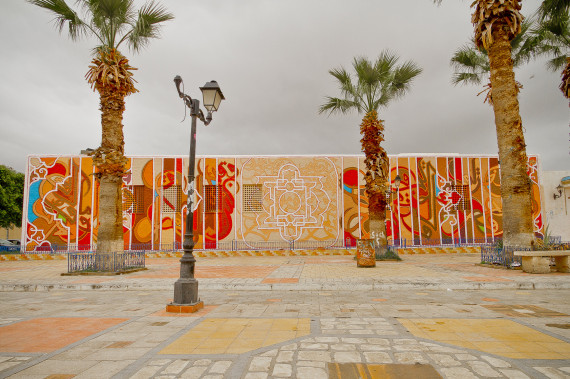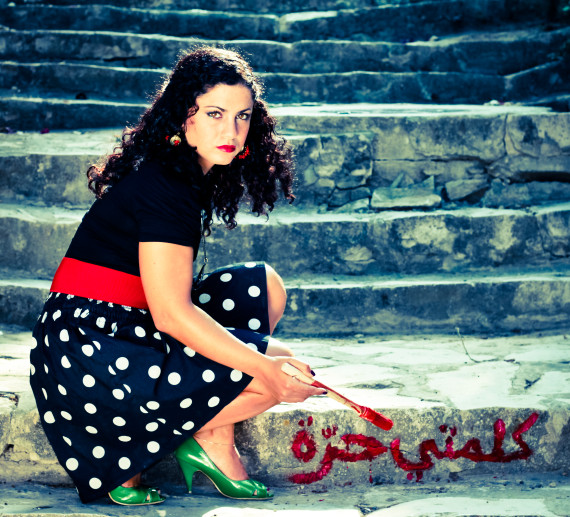The Arab Spring countries of North Africa and the Middle East are ushering in a new generation of contemporary artists, eager to express their social and political perspectives in an era of post-revolutionary change. Journalists have taken notice, shining a light on the region and its potential for explosive creativity by reporting on individuals and communities in Egypt, Libya, and Yemen who are leading the way for a renewed artistic culture in their respective locations.
The World Nomads festival is echoing this sentiment by choosing Tunisia as their country of focus for the 2013 biennial celebration. For the fifth edition of the festival, the French Institute Alliance Fran?aise (FIAF) is hosting a month-long bevy of multi-media events in New York dedicated to the art, music, dance and theater of the North African state. From the street art of eL Seed to the musical compositions of Emel Mathlouthi, the series of exhibits, lectures and performances seeks to showcase the innovation and experimentation brewing all across Tunisia.
We chatted with Marie-Monique Steckel, President of FIAF, via email, who explained the festival's interest in Tunisia and the burgeoning contemporary art scene she's witnessed there.

What attracted you to the art world of Tunisia?
The timing of World Nomads Tunisia was particularly great. The explosion of young talent in Tunisia after the revolution made me consider Tunisia with renewed enthusiasm for the return of our biennial World Nomads festival, after focusing on the art and culture of Morocco in 2011. Indeed, when I had the chance to go [to Tunisia] six months ago with Elizabeth Krief Manardo, our Tunisian-born Visual Arts Advisor, we saw a real thriving scene with young talent, particularly the involvement of women in the arts scene, which we wanted to showcase in NY.
What types of art-making dominate the creative scenes in the country?
As you know, Street Art was illegal under the pre-revolutionary government, and is therefore a newly expanding medium for expression. Truly though, what dominates the new creative scene is music, songs, and photography. Our festival reflects this with three wonderful singers, notably Emel Mathlouthi, the voice of the revolution, who will perform songs banned in Tunisia at her concert at FIAF on May 22. The photography exhibition at White Box is also particularly powerful, with great pictures of street demonstrations and photos of women that capture the new creative scene in the country.

How important do you think the artist's role is in this period of identity building post-revolution?
I feel the artist?s role is extremely important and felt by a lot of Tunisian young women and men. The revolution was an opening for creative talent to flourish and an invitation for people to express themselves. I believe they have an important role in the shaping and sharing of a sense of freedom that is experienced by the entire country.
Is a lot of the art you see in Tunisia politically oriented? What types of social or political issues are addressed by artists?
A lot of the art that we see deals with the role and status of women, and the strong desire not to return to a time of oppression and restrictive rules for women, who had made great strides for increased rights since 1956. Whether it is photography, painting or sculpture, many works are influenced by this tension, keenly felt by many artists. A key example is work by Mohamed Ben Slama, whose strong, evocative paintings of women were the subject of controversy. In June 2012, a painting of his featuring a nude woman surrounded by hovering, bearded men was lacerated and burned by the Salafists at the La Marsa art fair. He even received death threats and had to flee Tunisia, and is now in political exile.
If you could choose a few emerging Tunisian artists we should know about, who would they be?
It is so difficult to choose with so many great artists represented in this festival, and so many more we did not get a chance to showcase. I would say Mohamed Ben Slama for his courage in the face of the political situation, but all of the artists presented in our gallery exhibits have struggled. For graffiti artists, Jaye and eL Seed have done amazing work with our festival in NY, and I am excited to continue to watch their careers.
World Nomads Tunisia is hosting events throughout the month of May. Check out the calendar here. Scroll through the slideshow below for a look at the work of Tunisian visual artists and festival participants eL Seed and Mohamed Ben Slama.
"; var coords = [-5, -72]; // display fb-bubble FloatingPrompt.embed(this, html, undefined, 'top', {fp_intersects:1, timeout_remove:2000,ignore_arrow: true, width:236, add_xy:coords, class_name: 'clear-overlay'}); });
lsu football lsu football Jessie Andrews bloomberg bloomberg Daily Caller Staten Island
No comments:
Post a Comment